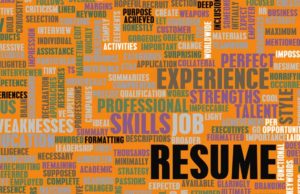 Answer: When I launched the blog last year, the first topic was resumes. I asked. “Why are they so hard to write, especially for Comms VPs?” I also added, “What are the 3 words/phrases I never want to see in the first paragraph of a resume?” To save you time, here are the answers: strategic, 20+ years of experience and executive leader/manager. Truthfully, those words were eliminated from some resumes I received but the content did not improve. Here’s a new approach to creating a winning resume. It’s all about concept, viewpoint and insight.
Answer: When I launched the blog last year, the first topic was resumes. I asked. “Why are they so hard to write, especially for Comms VPs?” I also added, “What are the 3 words/phrases I never want to see in the first paragraph of a resume?” To save you time, here are the answers: strategic, 20+ years of experience and executive leader/manager. Truthfully, those words were eliminated from some resumes I received but the content did not improve. Here’s a new approach to creating a winning resume. It’s all about concept, viewpoint and insight.
Before you begin to assemble your thoughts for updating your resume, here’s the concept. I’m asking you to reverse your thought process and instead of thinking about what you want to share about your experience, to think about what the hiring manager (or his HR partner) is thinking. Can you imagine what his first question is as s/he looks at the resume?
Since we are just at the beginning phase of the hiring process, visualize a stack of material to review or a file filled with resumes. This is not a fun job and the company representative knows that the goal is to find no more than 10 or more likely, no more than 5 resumes that appear to be interesting. Here’s the answer: “Is this resume worth reading to the end or can I save time and eliminate it?”
I’m assuming that you have been in those shoes and you know that is what really happens. How long did it take you to make that judgment? On what basis did you eliminate an applicant? Didn’t you have a short mental checklist? You were looking for answers to the most important questions. You were not looking at an elaborate job description to decide if the applicant were qualified. Instead you had distilled the criteria.
Assuming you were looking for “A” team candidates, you wanted to know if this candidate had impressive enough credentials (so the title mattered) with a company at the appropriate size to be in your “league.” You also wanted to know approximately if s/he had a reasonably stable work history and if his/her total work experience was appropriate for that achievement. For example, if the candidate took 15-years to become a Manager in one organization, that would not be impressive.
Let’s apply this thinking to creating your resume. If you now have that viewpoint in mind to guide you, let’s return to your challenge. Will this insight allow you to mentally edit what message you wish to convey to a reader who has seconds to decide that you are a “keeper?”
Essentially, the first paragraph which summarizes the highlights of your career and the second paragraph which describes your current work experience are your two opportunities to send an effective message. How much time do you have? Is it perhaps 15 seconds? This is the resume version of the infamous “elevator pitch” when you have 3 sentences to describe what you do. It takes a great deal of thinking and editing to arrive at a simple, effective answer.
Here’s my suggestion about what to include in the introductory paragraph of your resume. Choose the most specific words and omit adjectives. If you have an impressive title and company credentials say so. If the company is not well known, immediately describe it, e.g. 7-billion-dollar global instrumentation company in the Aerospace industry. If you have a specific objective in mind that matches the position, indicate that as well.
In the next paragraph provide title and explain the length of time with the company. If there have been a series of promotions indicate that, e.g. promoted 3-times in 6-years with “X.” These are just examples to indicate factually that you are an achiever. The key is, don’t self promote. Adjectives distract from a results-oriented resume. This advice should put you on the path to a tightly constructed, effective document.
The series on resumes will continue as I talk about how the resume overall needs to tell the right “story” and leave an accurate impression about your talents. Also there are trends affecting employment. How you present your expertise will need to adjust as hiring organizations add new criteria to job descriptions.
Please send me questions about specific career issues and how to address them in the resume.
